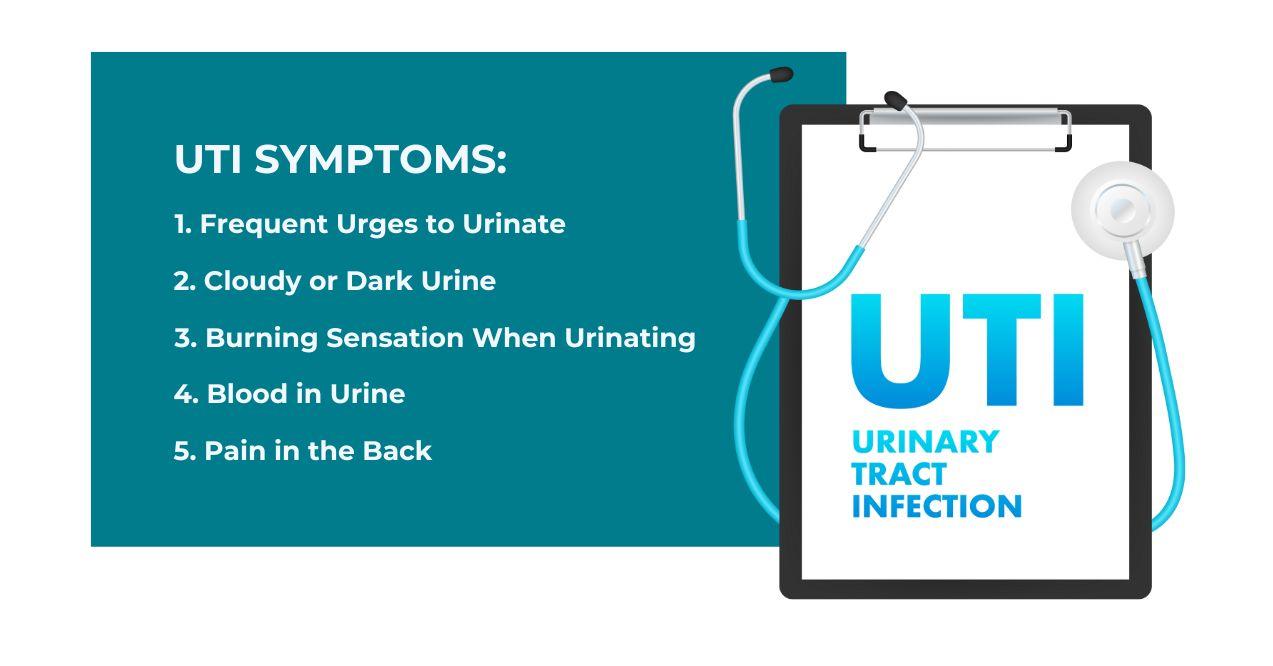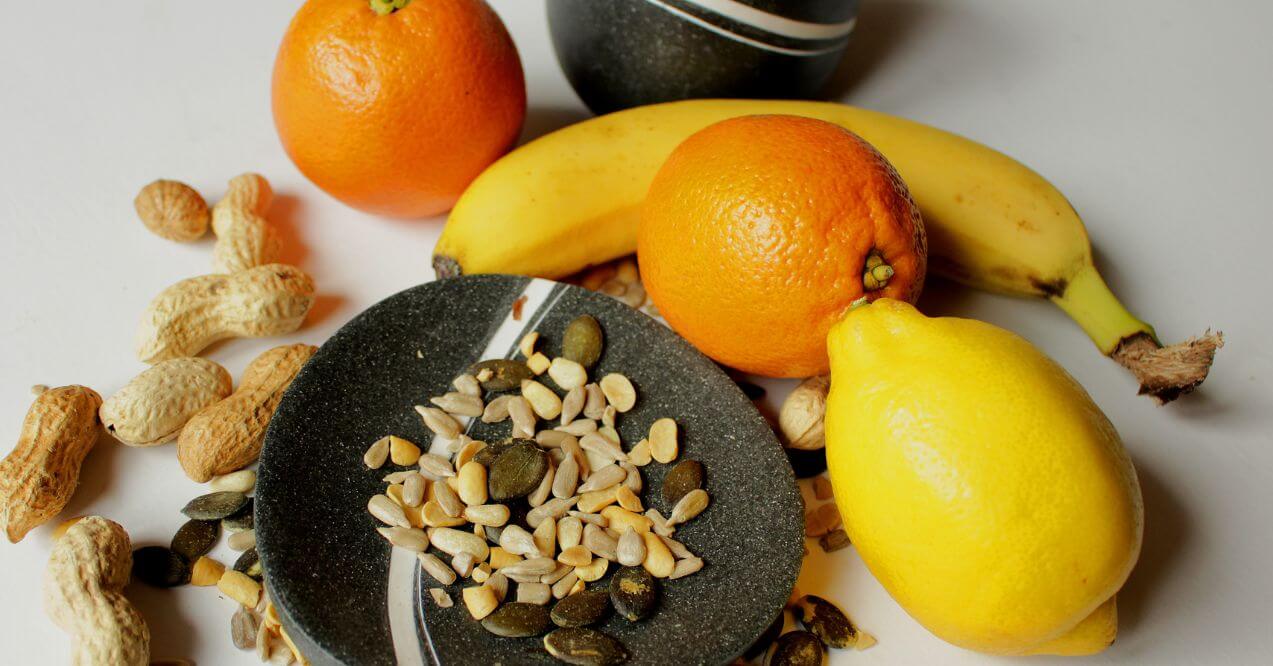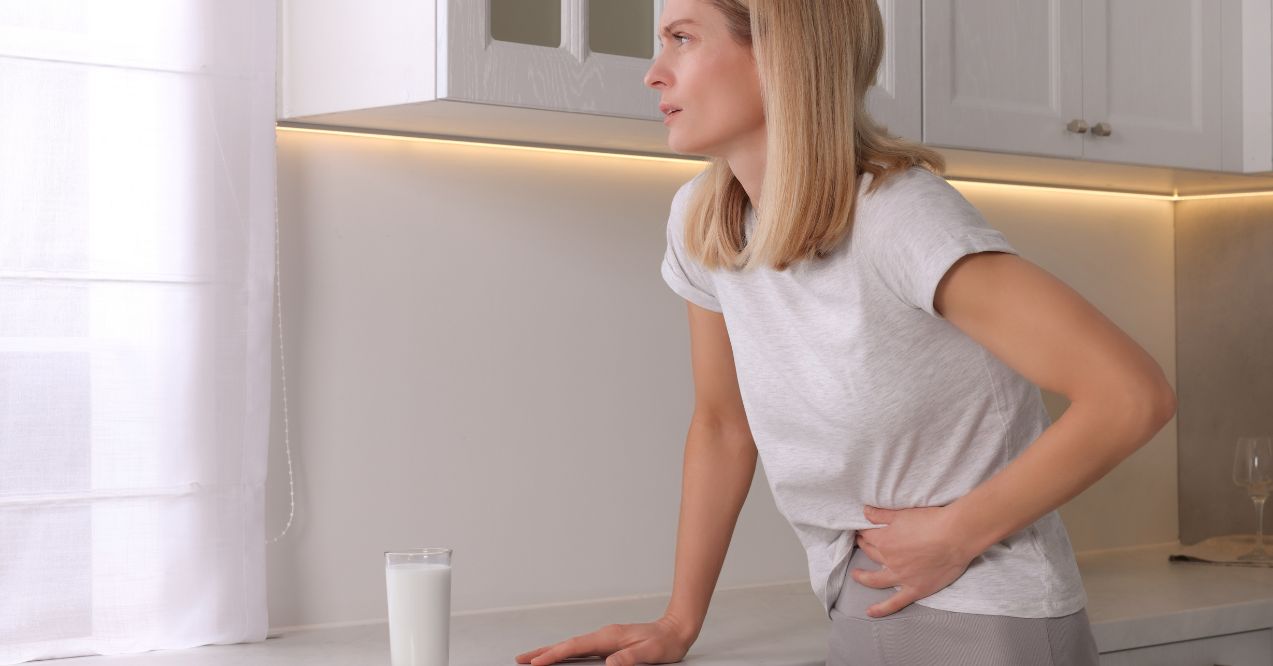Can a UTI Cause Bloating?
Medically reviewed by our experts


Can a UTI cause bloating? Believe it or not, this is a standard question among those grappling with a potential urinary tract infection. The association between UTIs and bloating may not be immediately apparent, but understanding it is paramount if you’re seeking clarity about your health.
While UTIs are primarily known for affecting the urinary system and causing very specific symptoms — such as pain or a burning sensation during urination, frequent urges to use the toilet, and lower abdominal discomfort — they can sometimes manifest in unexpected ways. But can bloating be one of them? And if so, why does a UTI cause bloating?
Join us on this informative journey as we explore the close-knit relationship between UTIs and bloating, providing valuable insights that empower you to take charge of your well-being. Let’s dive in!
What Is a UTI?
In a nutshell, urinary tract infections (UTIs) are common bacterial imbalances that affect any part of the urinary system, including the urethra, bladder, ureters, and kidneys. UTIs are the second most common type of infection in the United States, affecting about 10 in 25 women and 3 in 25 men at any point during their lifetime.
Who’s more susceptible to UTIs:
- UTIs are more common in women due to shorter urethra.
- Recurrent infections are frequent in women.
- E. coli from the digestive system often causes UTIs.
- Hormonal changes during pregnancy and menopause increase risk.
- Sexual activity and certain contraceptives can raise UTI risk.
Wondering how long does a UTI last? Well, that depends on the severity of the infection, the type of bacteria causing it, and the individual’s overall health. Most uncomplicated UTIs can be treated effectively with antibiotics and cleared within a few days. However, completing the prescribed antibiotic course is critical even if symptoms alleviate early to prevent recurrence and complications.
UTIs have become a significant public health concern due to their high prevalence, morbidity, and economic burden — estimated to be over $1.6 billion annually in the United States. They are often associated with a range of mild to moderate symptoms that can be easily managed. However, if left untreated, UTIs can also lead to more severe complications, such as kidney infections and bladder damage. Still, can a UTI cause bloating? Let’s find out.
Can a UTI Actually Cause Bloating?
Bloating is not commonly associated with UTIs. Yet, it’s entirely possible to experience a sensation of abdominal fullness or bloating during the course of a urinary tract infection. After all, the proximity of the urinary system to the digestive organs in the pelvic region can lead to unexpected crosstalk between these systems.
To be certain, seeking medical attention is a must. Only an experienced healthcare provider can perform the necessary assessments to identify a UTI and decide the best course of action to solve the issue.
Understanding Why Does UTI Cause Bloating
Why does UTI cause bloating? In some cases, UTIs can induce inflammation and irritation in the pelvic area, affecting neighboring structures, including the digestive tract. This inflammation may cause a disturbance in normal digestive processes, leading to a perceived sensation of bloating.
The intricate network of nerves in the pelvic region can transmit signals that the brain may interpret as bloating or abdominal fullness. Furthermore, the body’s response to infection, including the release of inflammatory mediators, can contribute to generalized discomfort and a feeling of abdominal distension.
Recognizing UTI Symptoms

As mentioned earlier, identifying the common signs of UTIs is vital for timely intervention and effective management of your health concerns. These indicators serve as important alerts, signaling potential issues that may require a quick visit to your primary healthcare provider. Can a UTI cause bloating? That’s an excellent question, and we’ll get to that shortly. Still, here are other more important symptoms you should watch out for if you suspect you’re experiencing a UTI:
1. Frequent Urges to Urinate
Occasional urges to urinate are a natural part of daily life. However, an increased frequency that disrupts your regular routine may indicate an underlying issue. For instance, the irritation caused by a UTI on the lining of the urinary tract tends to cause inflammation and irritation. As a result, you could experience an exaggerated sense of urgency to urinate several times a day.
This symptom is particularly common during the initial stages of a UTI and can be accompanied by a persistent feeling of incomplete bladder emptying — even if the volume of urine expelled is relatively small. But the question remains: Can a UTI cause bloating? The discomfort caused by a UTI in the pelvic region may very well lead to a sense of pain or fullness. It’s not uncommon for people to perceive this as bloating, primarily if the infection is affecting the nearby organs.
2. Cloudy or Dark Urine
The color and clarity of your urine can provide valuable insights into your health. Cloudy urine, which appears hazy or murky, can be an indicator of various factors. The presence of white blood cells, bacteria, or other inflammatory substances can cause the urine to appear less transparent than usual. This symptom often reflects the body’s response to an infection in the urinary tract.
When you’re experiencing a UTI, the inflammation in the urinary tract can lead to small amounts of blood entering the urine — which we will expand on below. This situation will contribute to the urine’s darker appearance. On the other hand, dark urine, which may range from amber to brown in color, can result from dehydration, certain drugs, or underlying medical conditions.
3. Burning Sensation While Urinating
As stated above, UTIs cause irritation and inflammation within the urinary tract. When this happens in the urethra — or the tube that carries urine from the bladder out of the body — it can manifest as a burning sensation when urine passes through. This discomfort is typically more pronounced at the beginning or end of urination.
While a burning sensation is a hallmark symptom of UTIs, it’s not exclusive to this condition. Other factors, such as sexually transmitted infections, kidney stones, or inflammation, can also lead to similar discomfort during urination.
4. Blood in Urine
The presence of blood in your urine is a significant and potentially alarming symptom that requires immediate attention. It can occur due to the inflammation and irritation caused by the infection, which can lead to the rupture of tiny blood vessels in the urinary tract. When blood mixes with your urine, it often produces a pink, red, or even brownish hue, depending on the severity of the bleeding.
Blood in the urine is not exclusive to UTIs and can indicate various underlying issues, including kidney stones, trauma, or more serious conditions. Paying attention to the context and keeping an eye out for other symptoms is essential in identifying if the blood in your urine is indicative of a UTI.
5. Pain in the Back Just Below the Ribs
Can a UTI cause bloating? Not typically. However, it can travel up to your kidneys. These organs, located just below the ribs on either side of the spine, play a crucial role in filtering waste and excess fluids from the blood to form urine. When bacteria from a UTI ascend to the kidneys, they can cause inflammation and infection, resulting in a dull ache, sharp pain, or persistent discomfort in the back or flank region.
While back pain is a characteristic symptom of a more severe UTI affecting the kidneys, it can also be associated with other medical conditions such as kidney stones, muscle strain, or spinal issues. Still, you should always seek medical help if this symptom occurs to prevent a potential infection from progressing to your blood.
Conclusion
In your journey to optimal health, staying informed about the diverse manifestations of UTIs and taking proactive steps empowers you to take charge of your well-being. Seeking medical attention at the first sign of infection or taking supplements for gut health and digestion can spare you unnecessary complications and help answer questions like are UTIs contagious or can a UTI cause bloating? The guide above serves as your compass, navigating the nuanced signs of a UTI and enabling you to take decisive, proactive action.
While bloating is not a classic symptom of urinary tract infections, some mechanisms can contribute to a sense of abdominal fullness or bloating in some individuals during a UTI. The primary cause lies in the proximity of the urinary and digestive systems within the pelvic region.
Focus on treating the underlying infection with prescribed antibiotics. Additionally, stay hydrated, maintain a balanced diet, and consider incorporating probiotics.
UTI symptoms include pain or burning during urination, frequent urges to urinate, cloudy or dark urine, a burning sensation, blood in urine, and back pain.
















